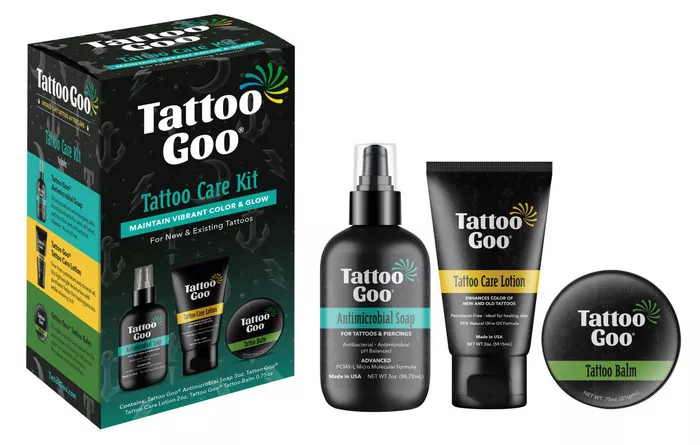Tattoos are a popular form of self-expression, but the process of getting a tattoo involves penetrating the skin with needles, which can lead to various stages of healing, including itching. Itching is a common part of the healing process, but it can be incredibly frustrating. Understanding what to put on a tattoo to stop itching can make the healing process more comfortable and prevent complications such as infection or scarring.
The Healing Process of a Tattoo
When you get a tattoo, the ink is deposited into the dermis, the second layer of skin. This process creates a controlled wound that your body needs to heal. The healing process generally involves several stages:
Initial Healing (Days 1-3): The tattooed area is usually red, swollen, and may ooze a small amount of blood or clear fluid. The skin feels sore, and this is when the risk of infection is highest.
Scabbing and Peeling (Days 4-14): The area starts to form scabs and will peel. This is when itching often becomes most intense as new skin cells form under the surface.
Continued Healing (Days 15-30): The tattoo begins to look clearer as it continues to heal. Itching may still occur but should be less severe.
Full Healing (Months 1-3): The skin fully recovers, and the tattoo settles into the skin. Itching should subside completely.
Causes of Tattoo Itching
Understanding why your tattoo itches can help in managing the discomfort effectively. Here are the primary reasons for tattoo itching:
1. Dry Skin: Tattoos can cause the skin to dry out, leading to itching.
2. Healing Process: As the skin heals, it regenerates, which can cause an itchy sensation.
3. Scabbing: Scabs are a natural part of the healing process but can be itchy.
4. Allergic Reactions: Some people may be allergic to certain inks or aftercare products.
5. Infection: Although less common with proper care, infections can cause itching.
What to Put on a Tattoo to Stop Itching
Managing tattoo itching involves using products that moisturize, soothe, and protect the skin. Here are some recommended solutions:
1. Moisturizers and Lotions
Using a gentle, unscented moisturizer can keep the skin hydrated and reduce itching. Look for products that are free of dyes, fragrances, and alcohol, as these can irritate the skin. Here are some options:
Aquaphor Healing Ointment: This is a popular choice among tattoo enthusiasts. It provides a protective barrier that helps retain moisture.
Lubriderm Daily Moisture Lotion: Known for its lightweight and non-greasy formula, it’s often recommended for tattoos.
Aveeno Daily Moisturizing Lotion: Contains colloidal oatmeal, which can soothe and moisturize dry, itchy skin.
2. Tattoo Aftercare Products
Several products are specifically formulated for tattoo aftercare. These products are designed to aid the healing process and reduce itching:
Tattoo Goo Aftercare Lotion: Contains herbs and vitamins that promote healing and reduce itching.
H2Ocean Ocean Care Tattoo Aftercare: Uses sea salt to help heal and hydrate the skin.
After Inked Tattoo Moisturizer & Aftercare Lotion: A vegan product that keeps the skin moisturized and reduces itching.
3. Hydrocortisone Cream
For severe itching, over-the-counter hydrocortisone cream can be effective. However, it should be used sparingly and only with the advice of a healthcare professional, as overuse can lead to skin thinning and other side effects.
4. Natural Remedies
Some people prefer natural remedies to alleviate itching. Here are a few options:
Coconut Oil: Known for its moisturizing and anti-inflammatory properties, it can soothe the skin and reduce itching.
Aloe Vera Gel: Has cooling properties and can soothe irritated skin.
Chamomile Tea Compress: Soak a clean cloth in cooled chamomile tea and apply it to the tattoo. Chamomile has anti-inflammatory properties that can reduce itching.
5. Cold Compresses
Applying a cold compress can numb the area and reduce itching. Use a clean cloth soaked in cold water or an ice pack wrapped in a towel. Avoid applying ice directly to the skin.
What to Avoid
While it’s important to manage itching, there are also several things you should avoid to prevent complications:
1. Scratching or Picking: Scratching can introduce bacteria into the wound, leading to infection, and picking at scabs can cause scarring and ink loss.
2. Hot Showers: Hot water can dry out the skin and exacerbate itching. Opt for lukewarm showers instead.
3. Harsh Soaps: Use mild, fragrance-free soap to clean the tattooed area.
4. Heavy Ointments: Avoid products like petroleum jelly, which can suffocate the skin and trap bacteria.
5. Sun Exposure: UV rays can damage healing skin and cause color fading. Protect your tattoo from the sun with clothing or a broad-spectrum sunscreen once it’s fully healed.
Professional Advice and Considerations
If itching persists or is accompanied by other symptoms such as redness, swelling, or discharge, it’s crucial to consult a healthcare professional. These could be signs of an infection or an allergic reaction. Additionally, follow your tattoo artist’s aftercare instructions carefully, as they have experience and knowledge specific to the tattooing process and healing.
Conclusion
Tattoo itching is a common part of the healing process, but it can be managed effectively with the right products and care. Using moisturizers, tattoo-specific aftercare products, and natural remedies can provide relief and promote healing. Avoiding irritants and following professional advice will ensure your tattoo heals properly and looks its best. By understanding and addressing the causes of tattoo itching, you can enjoy your new artwork without unnecessary discomfort.

